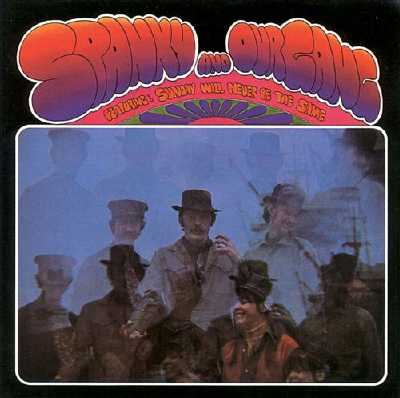 SKC Films Library SKC Films Library |
| SKC Films Library >> Music >> Biography: Musical Groups |
| Spanky & Our Gang "Sunday Will Never Be the Same," "Sunday Morning," "Like to Get to Know You"
Elaine McFarlane's first professional gig was in a jazz-based singing group called the Jamie Lyn Trio in 1962. In 1963 she joined the New Wine Singers, who mixed folk and protest songs with jazz. It was during her tenure with this group that she acquired the nickname "Spanky," because some of her fellow band members thought she looked like Spanky McFarland of Little Rascals fame. She also became friends with the group's trombonist/singer Malcolm Hale. The New Wine Singers broke up in late-1965 and McFarlane went to Coconut Grove, Florida, where she met bassist Paul "Oz" Bach and guitarist Nigel Pickering at a hurricane party. After three days of jamming, McFarlane invited Bach and Pickering to join her in Chicago, which they did later that year. Back in Chicago, McFarlane was working as a singing waitress at a club called Mother Blues when owner Curly Tait asked her to assemble a group to open for outside acts. McFarlane recruited Bach and Pickering and the trio then began putting together a combination music-comedy act called Spanky & Our Gang. The act received very favorable reviews and before long the trio was being asked to perform at other clubs. Malcolm Hale joined the group as guitarist-trombonist at this time, and Curly Tait became the band's manager. In late-1966 the group was signed by Chicago-based Mercury Records, which teamed it with producer Jerry Ross. At their first recording session in New York, they were given a song called "Sunday Will Never Be the Same," which had already been offered to the Mamas & the Papas and the Left Banke. Hale came up with the song's vamped vocal opening, which became the group's signature. The single was released in May 1967, and peaked at number 9 on the charts in June. Drummer John"The Chief" Seiter joined the band later that summer. The band's second single, "Making Every Minute Count," only made it to number 22 on the chart, and "Lazy Day" peaked at number 14. By the end of 1967 the band was making appearances on national television and Mercury Records was anxious to release its first album. The self-titled album included the band's three singles, a handful of new songs (including "Five Definitions of Love," which was literally the dictionary definition of "love" set to music), and even a few songs the band hadn't even finished yet (most notably "Brother Can You Spare a Dime"). In early 1968, Oz Bach left the group and was replaced by bassist Kenny Hodges, who also brought his friend Lefty Baker (real name Eustace Britchforth) along as guitar/banjo player and singer. The band also dropped producer Jerry Ross in favor of Stuart Scharf and Bob Dorough because it wanted a less polished sound. The new six-person group recorded the hits "Sunday Morning" (#30) and "Like to Get to Know You," (#17) the latter of which became the title of the band's second album. In addition to those two singles, this album also included songs with blues and '40's-style vocal jazz-pop influences, as well as the harmony number "Stardust," which inspired the Manhattan Transfer, and the defiant protest song "Give a Damn," which managed to reach number 43 on the charts despite being banned by many radio stations. Spanky & Our Gang's third album, Anything You Choose/Without Rhyme or Reason, portrayed the group in a whole new way. Devised as a continuous stream of music with blues, jazz, folk, and pop influences, most of the instruments were played by studio musicians instead of band members, and much of the group's trademark upbeat style was absent. Aside from the previously released "Give a Damn," no song on the album got above number 90 on the charts.
In October 1968, 27-year-old Malcolm Hale died suddenly of pneumonia. Devastated by his loss, the band played out its concert commitments while it reassessed its future. Now pregnant, McFarlane was already considering leaving the group, and Seiter had been asked to become the drummer for the Turtles. Rather than try to carry on with new members in such key positions, the band decided to call it quits. McFarlane and her husband Charly Gavin subsequently prepared and released Spanky's Greatest Hits, which included remixed versions of several key songs. In 1970, Mercury Records released Spanky & Our Gang Live, prepared from an amateur recording of one of the group's earliest shows. In 1975, McFarlane and Pickering reformed Spanky & Our Gang around a country-western sound and released Change for Epic Records. Despite the great difference in sound between the old Spanky and the new, the reformed group attracted many old fans to its concerts, which also featured original member Oz Bach. The new group played concerts and Texas bars before once again disbanding in 1980, this time for good. McFarlane replaced Cass Elliott in the reformed Mamas & the Papas in 1982 and stayed with them for twelve years and then toured as a solo act for a few years before retiring from the music scene entirely. Oz Bach did of cancer in September 1998. Nigel Pickering now lives in St. Augustine, Florida, where he continues to perform when possible. SOURCE |
| SKC Films Library >> Music >> Biography: Musical Groups This page was last updated on 06/16/2017. |



